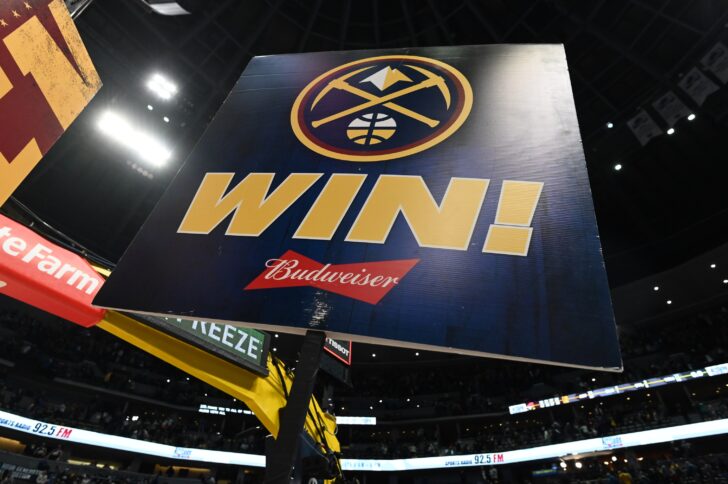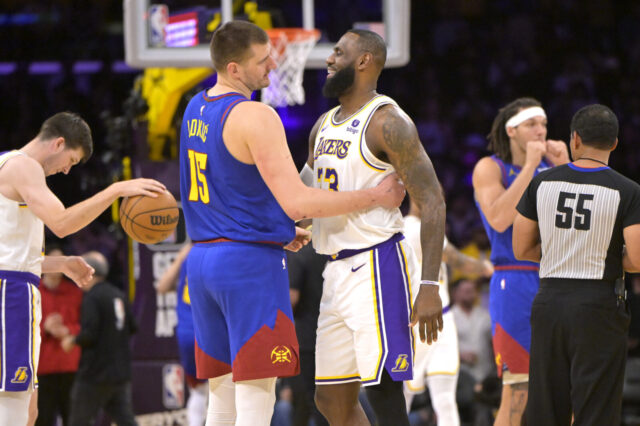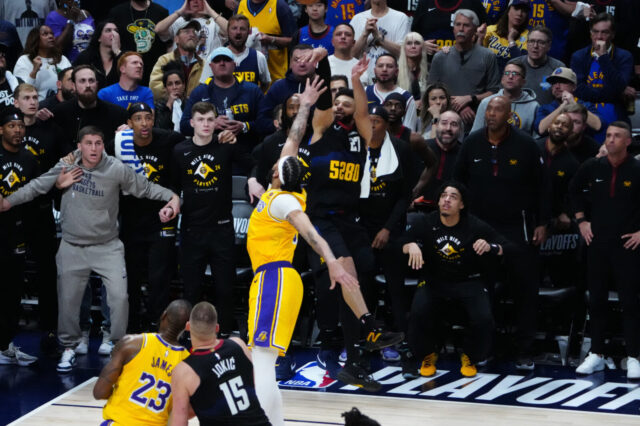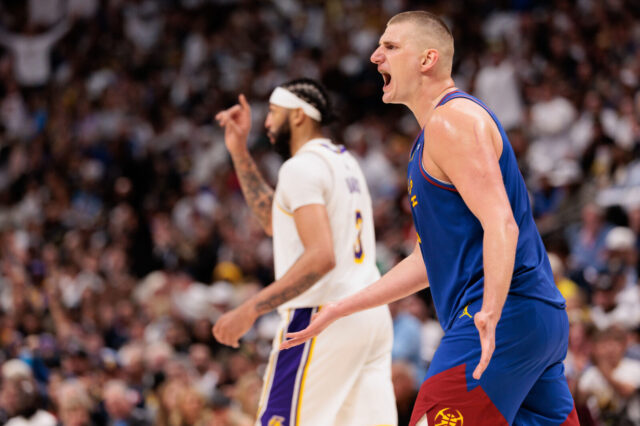This morning, sports fans Colorado will wake up with a smile, knowing that their local NBA and NHL teams are good. Damn good.
The Denver Nuggets currently sit in second place in the NBA’s Western Conference. The Colorado Avalanche sit in second place in the NHL’s Central Division while also possessing the second-highest point total in the Western Conference. For both teams, when it comes to the playoffs, it’s no longer a matter of “if” but instead “how far.” It’s a nice change for a fan base that’s hasn’t been rewarded very often of late when it comes to the playoffs. Not including last season, the Avalanche only made the postseason in three out of 10 years; the Nuggets missed the postseason for five straight seasons.
Relatively speaking, the on-court and on-ice products offered at Pepsi Center are excellent. Any complaints about them are born of new and exciting expectations.
But you know the old saying.
You get what you pay for.
Well, sort of. In the world of professional sports, or at least the ones played inside Pepsi Center, you pay for what you get. It’s a subtle difference, but it’s true. When the Nuggets or Avs are bad, nobody ever offers a refund. But now that they’ve been good of late, it’s time to pay up.
This was never more evident than on Thursday night, when I received an email that contained a number that made me do a double take, the kind that jumps off of a credit card statement like a Jerami Grant dunk.
“That can’t be right,” I thought, trying to do the math in my head. The number was nowhere near the typical charge that appeared as part of my season ticket “auto-pay.” The other thing that stood out was a date – March 1 – upon which the first installment would be charged, just one business day and three days from getting the email.
Now, to be fair, earlier notices were sent. When I inquired about this, I was told that I’d received such correspondence, but failed to open the link that outlined some of the details. I’m sure that’s true, as I get plenty of emails from the Nuggets regarding promotions, offers, events and games (admittedly, they’ve become white noise, as so many “auto-emails” do). Nowhere in the body of the previous emails could I find an actual dollar amount – that was only available through an embedded link that redirected to my account. I was never contacted by phone, either, a practice that has taken place in past seasons. I’m not saying the information was unavailable or even dishonest, but it also wasn’t highly publicized or easily found (that’s just my opinion), but I was not alone in being surprised.
One season ticket holder I spoke with said, “I never saw the amount in an email prior to the most recent notice. I don’t open all of them. As soon as I did though, I called my ticket rep. I have a feeling the calls and emails into the team will really pour in as soon as people notice the charge on their credit card.”
More yet tweeted their surprise reactions.
https://twitter.com/DezKochis/status/1233174843358576641
And Avalanche fans did too.
Av season ticket renewal is due Feb 27. My tick prices are going up considerably (15%). Not sure how the Nuggets do it. Would people be willing to drop their Av and Nugget season tickets if KSE does not immediately:
1. Get a TV contract with Comcast.
2. Commit to fixing tix mngr?— Glass-blowin' Cobra Man (@BobInBoulder) February 17, 2020
To make a long story short, and get to the point, my seats had gone up by $30 per game (or 17.65 percent) and I had to decide whether I wanted to pay for them quickly.
The hook, for better or worse, is that if I chose to continue, I’d get the first shot at playoff tickets at season ticket holder prices – still higher than the price of a regular season ticket, but lower than the price for non-season ticket holders or for current season ticket holders who’d decided not to commit to the 2020-21 season. In essence, the playoffs – a should-be reward for a loyal patron – are being leveraged to obtain my business (at an increase price) for next season.
Naturally, I emailed my ticket rep (two of them in fact). I got an auto-response, essentially letting me know they were receiving a high-volume of email inquiries (I’ll bet) and would respond in the order in which emails were received and as soon as possible.
Turns out, there must have been a ton of other emails; and “as soon as possible” wasn’t very soon. I got my first response Friday at 3:25pm and have yet to get the second. Having more questions (both for pricing clarity and for purposes of this article), I chose to aim higher up the food chain, so I sent an email late Friday night to team executives. To their credit, I received detailed answers Sunday at 4:25pm. I didn’t love the answers, but they were answers nonetheless.
“When evaluating pricing for the 2020-21 season, we took into consideration several different ticket sales data points, these included primary market sales, secondary market sales, and sell-through of various ticket products, among other data points. It should be noted that that Nuggets season ticket pricing is below the NBA average. There were some areas of the arena where prices stayed level with the 2019-20 average ticket price,” wrote David Burke, KSE Executive Vice President, Chief Ticketing and Strategy Officer.
How many seats that remained static in terms of pricing, or the location of them, was not specified.
I poked around some more. As a member of a family that’s had Nuggets season tickets (all or part of a four-seat purchase) since 1993, I was not pleased. A night out with friends or family had just gone up in price to the tune of $120. I learned, too, that Avs season ticket holders were in the same boat.
One friend I asked, a courtside (see “Club Lexus”) season ticket holder who wished to remain anonymous, had this to say: “The increase, in the range of 15%, seems fairly steep given the amenities that are provided to courtside members. The food quality in the Lexus club has declined this year and an increase in ticket costs is not supported by this aspect of the total offering. The product on the court, the Nuggets, which is honestly why the 15% increase is even a possible ask of season ticket holders, looks like a solid entertainment package with a lot of potential for the 2020-21 season. One item of note is that I have been told that KSE is only trying to “meet prices in other markets.” If they are comparing to markets other than LA, San Francisco, Miami, Chicago, Boston and New York/Brooklyn, that is fine as a comp, but to include those incredibly high-priced locations in any comps of locations is simply not a reasonable comparison. Some increased transparency as to the basis of their comparisons to determine that a 15% increase in prices is required to keep up with comps, when general market inflation is in the low single digits, seems appropriate.”
We talked at length about the increase.
It’s a matter of supply and demand, we said. If the team is good, someone is willing to pay. We both questioned how willing we still were, especially since bumping prices from year to year – at least at this level – is not a common process for either team (I don’t recall getting any emails like this when Brian Shaw was at the helm).
It felt like, we said, that the revenue lost from Comcast and DishNetwork subscriptions was coming into play. While the teams that play at Pepsi Center, and the hard-working folks that cover them for Altitude television and radio, are accusing local cable carriers of having a total disregard for fans, somebody, somewhere, decided the best way to reward a fan base that hasn’t been able to watch most games on TV this season, would be to charge them 15 percent more for their season ticket purchase (and who knows how much more for walk-up tickets).
I have no idea how much revenue has been lost because of the Altitude mess (actually I have some idea – call it an educated guess – but there are so many rumors circling the situation, it’s extremely irresponsible to print anything but a fact). I can safely say that it’s a boatload (define that however you like). And nobody likes to miss out on a boatload of money.
Whether Altitude and the Nuggets and the Avs are technically or financially tied together doesn’t really matter – what does is that one entity owns all of them. Cable carriers might have stopped stuffing the left fist full of dough, but it feels like the right hand has suddenly been outstretched, asking fans to pick up the shortfall, or at least some of it.
According to Yahoo!Finance, the Nuggets current average ticket price already ranks 9th in the NBA at $154 per game. Hypothetically, if that price was raised by 10-15 percent – with a capacity of 19,520 for basketball games – the simple math suggests a $300-450K increase for any game that’s sold out. Or, if there’s a season worth of sellouts, that’s like finding $12.3-18.5 million per season in the couch cushions. Assume the Avs bring in similar, maybe slightly lower, numbers, and one might “guesstimate” that raising tickets by 10-15 percent for hockey and hoops could mean an additional $20(?), $30(?), $40(?) million per year coming into The Can. This is all pure, educated speculation, of course, and we know that not every game is a sellout (Hey, it’s Denver and the Nuggets have only ventured into the NBA Western Conference Finals twice… the product isn’t that good just yet), but you can see that a little simple math can make a nice dent in what’s been lost in cable revenues.
Interestingly enough, Nuggets guard Jamal Murray will make $29.25 million next season (and almost $170 million for the next five seasons – compared to just $4.4 this season); All-Star center Nikola Jokic made $1.5 million during the 2017-18 season, but will earn almost $150 million between 2018 and 2023. On the ice, Avs winger Mikko Rantanen just inked a 6-year, $55.5 million contract. Is there a coincidence taking place here? You be the judge, but that’s a lot of money, no matter who’s picking up the tab.
Funny though, it sure feels like we are.
My rudimentary math could be high or low or inaccurate, but that $30 increase per seat is a number I can take to the bank – or out of it, as it were.
It sure feels like the Nuggets and Avs are passing the buck.
To you and me.



